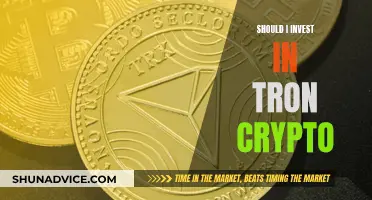
Bitcoin and Ethereum are two of the best-performing large-market-cap cryptocurrencies. Bitcoin is currently the most highly valued cryptocurrency, but Ethereum, the second-largest, has been taking an increasingly large share of the market. While Bitcoin was designed as a way to carry out digital payments, Ethereum supports a complex financial ecosystem. Both have their own advantages and disadvantages, and deciding whether to invest in one or the other depends on your market analysis.
What You'll Learn

Bitcoin's status as a safe haven
Bitcoin's reputation as a safe haven was put to the test during the coronavirus pandemic. As global stock markets tanked, so did Bitcoin and other crypto-assets, while gold, a traditional safe-haven asset, skyrocketed. This divergence led some to believe that Bitcoin's status as a safe haven had been tarnished.
However, Bitcoin has shown signs of being a safe-haven asset during other periods of global turmoil. For example, during the conflict between the US and Iran in 2020, Bitcoin rose over 20% while tensions escalated. Similarly, during the 2013 Cypriot financial crisis, Bitcoin entered a bull rally, skyrocketing by 1,950%.
Some analysts argue that Bitcoin is still relatively young and lacks the widespread adoption and use cases of traditional safe-haven assets like gold. Others point out that Bitcoin's correlations with other assets are very dynamic, shifting from equities to gold depending on the situation, and that its status as a safe haven should not be invalidated by occasional price movements that mirror riskier assets.
Overall, while Bitcoin has shown potential as a safe-haven asset, its performance during times of economic distress has been mixed. Its status as a safe haven remains a subject of debate among investors and analysts.
Smart Ways to Invest $200 in Bitcoin
You may want to see also

Ethereum's technological improvements
Ethereums Technological Improvements
Ethereum is a cryptocurrency with a difference. Unlike Bitcoin, which was designed for simple digital payments, Ethereum is a network that supports a complex financial ecosystem. It is a platform for developers to build applications in areas like NFTs, blockchain gaming, the metaverse, and Web3.
Ethereum has been undergoing significant improvements to its blockchain architecture. These changes aim to make the network faster, more secure, and more scalable.
One of the main upgrades is the transition from a proof-of-work to a proof-of-stake protocol, known as "The Merge". This change addresses Ethereum's environmental issues by reducing its energy consumption.
Another key upgrade is "The Surge", which focuses on improving scalability through sharding. Sharding splits the blockchain so that validators are only responsible for a fraction of the total data, making it easier for the network to support Layer 2 networks.
"The Verge" is another important upgrade that introduces "stateless validation". This allows validators to participate without being restricted by hardware requirements, making the network more accessible and efficient.
"The Scourge" incorporates additional features requested by the Ethereum community, such as improving access to data and reducing MEV (a type of transaction that takes advantage of differences in information between network participants).
Finally, "The Splurge" is a catch-all category for improvements that don't fit into the other buckets, including the use of zero-knowledge proofs for security and privacy, and the potential need for quantum-resistant encryption in the future.
These technological improvements to Ethereum's network demonstrate its adaptability and potential for growth, making it an attractive investment opportunity for those looking beyond Bitcoin.
A Beginner's Guide: Investing in Bitcoin Cash in the UK
You may want to see also

Bitcoin's user adoption rates
Bitcoin's adoption peaked in 2021, with over 41 million BTC addresses holding at least $1 worth of BTC. However, in an August 2023 report, around 77% of crypto owners in the US said they owned Bitcoin, which is 1% lower than the global bitcoin adoption rate of 37%. Globally, the crypto ownership rate is 15%, while in the US, it is 13%.
Factors driving Bitcoin's global adoption include its status as a store of value, interest from institutional investors, layer 2 scaling solutions, and the anticipation of Bitcoin ETFs. The interest from institutional investors has helped turn the image of Bitcoin from a virtual currency for criminal activity to a viable investment opportunity. Companies such as Grayscale, Tesla, Microstrategy, and the Block have considerable exposure to BTC.
Challenges to widespread adoption include high price volatility, centralised exchange risk, regulatory uncertainty, and the complexities of blockchain technology.
Bitcoin's future in 2024 is the halving event, which will decrease the mining rewards of the crypto substantially and limit the supply. Crypto advocates see this event as a critical moment, as blockchain may help automatically prevent BTC inflation while the demand for other hedges, such as gold, could continue to grow at a faster rate.
The Ultimate Guide to Investing in Bitcoin Now
You may want to see also

Ethereum's staking ability
Any user with any amount of ETH can help secure the network and earn rewards. Rewards are given for actions that help the network reach consensus, such as running software that properly batches transactions into new blocks and checks the work of other validators. The network becomes stronger against attacks as more ETH is staked because it requires a larger amount of ETH to control a majority of the network.
Staking Ethereum has several benefits. Firstly, it allows users to earn rewards in the form of additional ETH. Secondly, it improves the security of the Ethereum network by requiring validators to have funds at stake, which can be penalized for dishonest behaviour. Thirdly, staking is more energy-efficient than the previous proof-of-work method, as stakers do not need to perform energy-intensive computations to participate in securing the network. Finally, staking can be done through various methods such as solo staking, staking as a service, and pooled staking, allowing users to choose the option that best suits their needs and risk tolerance.
Overall, Ethereum's staking ability provides an opportunity for users to actively contribute to the network's security and earn rewards, making it an attractive feature for potential investors.
Bitcoin: Smart Investment or Risky Gamble?
You may want to see also

Bitcoin's institutional investor support
Bitcoins Institutional Investor Support
Bitcoin has seen a surge in institutional investor support in recent years. By the end of the second quarter of 2020, a survey by Fidelity found that 36% of almost 800 institutional investors owned crypto assets. A separate survey by Evertas projected that 90% of institutional holders of crypto assets expect to invest more in Bitcoin. This trend has continued, with institutional investors increasingly viewing Bitcoin as a hedge against inflation and currency devaluation. The introduction of quality custody solutions and regulatory clarity has also made Bitcoin a more attractive investment option for institutions.
The growing institutional investor support for Bitcoin is evident in the actions of publicly traded companies. For example, MicroStrategy and Tesla have made significant investments in Bitcoin, with Tesla buying $1.5 billion worth of the cryptocurrency. Local municipalities in the United States, such as Miami, are also considering using their city budgets to purchase Bitcoin.
The integration of institutional investors into the crypto ecosystem has contributed to a rally in the markets. Institutional investors view Bitcoin as a less risky investment compared to other assets, and their presence in the market instils trust and represents an understanding and belief in the technology.
The regulatory and custodian solutions that have been adopted provide security for institutional investors and hold cryptocurrency exchanges to a higher standard, protecting investors' money. The potential benefits of decentralized finance, such as access to new business streams, products, and services, further enhance the appeal of Bitcoin for institutional investors.
The proof of the growing institutional investor support for Bitcoin is evident in the numbers. According to a survey by Fidelity Asset Management, 80% of surveyed institutions find investing in digital assets appealing, and the number of Bitcoin addresses has been steadily increasing. Additionally, a report by KPMG found that major banks, asset managers, and qualified custodians are launching a new wave of institutional-grade crypto products and services, confirming the trust and belief in the digital asset from a place of power.
The Ultimate Guide to Buying Bitcoin Investment Trust
You may want to see also
Frequently asked questions
Bitcoin was designed as a way to carry out relatively simple digital payments, whereas Ethereum is a network that supports a complex financial ecosystem. Ethereum can support smart contracts, which are self-executing pieces of computer code, but Bitcoin cannot. Ethereum also has staking, which means investors can potentially receive a yield, whereas Bitcoin has been criticised for being unproductive in this sense.
Bitcoin has greater acceptance by traditional finance, evidenced by the approval of spot Bitcoin ETFs in 2024. It is also the most highly valued cryptocurrency and has seen rapid price gains. It is likely to see a massive surge in its user base as it continues to go mainstream.
Ethereum has a strong case for future growth, with improvements to its blockchain architecture in the works. It is also more likely to benefit from increased development activity in crypto than Bitcoin. It could also be undervalued by as much as 25% right now.
The performance of crypto assets can be highly volatile, and you should be prepared to lose all the money you invest. The crypto market is generally unregulated, and there is a risk of losing money or assets due to cyber-attacks, financial crime, and firm failure. You may also not be able to sell your investment when you want to.







